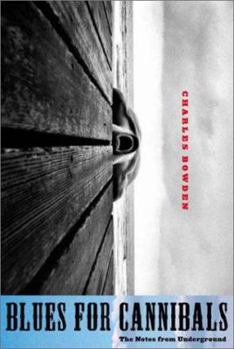Blues for Cannibals: The Notes from Underground
Select Format
Select Condition 
Book Overview
Blues for Cannibalscontinues the quest Bowden began inBlood Orchid-to discover the headwaters of the sickness that seeps through the American soul, and to consider what it might mean to come fully alive in a time of exalted consumption, global pillage, gated communities, and wholesale destruction of the environment. Down, down he leads us, in intoxicating, nearly hallucinogenic prose-past the Yaqui, the Anasazi, and other ghosts of our collective...
Format:Hardcover
Language:English
ISBN:0865476241
ISBN13:9780865476240
Release Date:February 2002
Publisher:North Point Press
Length:288 Pages
Weight:1.02 lbs.
Dimensions:1.1" x 5.8" x 8.6"
Customer Reviews
4 ratings
beautiful writing, scary images, life
Published by Thriftbooks.com User , 22 years ago
Blues for Cannibals can be a hard book at times to work through. The ideas become circular and repetitive but the beautiful writing often smooths over these rough spots, while at other times there is true beauty, touched with both horror and sadness, in its words and thoughts. Charles Bowden writes near the beginning that if he had life to live over again he "would never think that wars are events recorded in the book of history but realize they are actual and always take my hands from my ears and hear the cries of the slain." Much of this book is filled with those cries, and not only from war. He also would never say no to a woman or skip a meal. From evidence in this book, one gets the feeling he never has. The section on food and his dying friends is the best part of the book and reverberates with a quiet power. An unique book.
Dirt, water, sex, and food.
Published by Thriftbooks.com User , 22 years ago
Charles Bowden places himself as a steel wedge into the crevices, what we've created of ourselves and our environment, the unsavory places, the mirror that we all shield our faces from, the places that we are all afraid to venture. He drives himself into these places because he knows that he ... we ... have become fearful hypocrites. Once set, he kicks violently at the business end of that wedge with his feet to drive himself in further, going as far as a man can go without letting go: dirt, water, sex, and food, with a little booze and drugs thrown in to soften the edge of our brutal contemporary reality.But now that he's found the courage to go to these places in our stead and make it back, he found it necessary to write about it and we find it necessary to read it. We know that we will likely never visit these places. We will only read vicariously and reflect nervously, remaining sadly and ultimately, fearful hypocrites to the end.
Bowden's Mesquite Manifesto.
Published by Thriftbooks.com User , 22 years ago
Charles Bowden's got the blues. "I am a fallen man and I know it," he writes, "and I accept the torture of living this fact. But I will be damned--and they say I surely will be damned--if I accept God's answer. So I do not pray. Nor do I worship. I can love, I can comfort. I am the tree struggling in the hot ground of my desert. No bended knee and please no messages from on high. The messages must come from here, from the ground itself or away with them. That is what I learn from the mesguite, my brother-in-arms" (p. 6). In his 293-page book of revelations, he looks deeply into our cold, modern culture of gated communities, suicide, death row inmates, and sexual predators, to discover we are cannibals now--"we can devour and take but cannot give" (p. 28)--living a life of unrestrained consumption without future.For too many of us, Bowden may be the best writer we've never read. His prose is powerful, prophetic, hallucinogenic, and poetic. Using mesquite as a metaphor to connect his essays, he encourages us to face the truth about American culture, and to question the people who try to give us easy answers. "I believe in dirt and bone and flowers and fresh pasta and salsa cruda and red wine," he writes. "I do not believe in white wine, I insist on color. I think death is a word and life is a fact, just as food is a fact and cactus is a fact" (p. 246). Although Bowden's "Mesquite Manifesto" is rooted in despair, in the end it encourages us to celebrate life: eat, lust, caress, fight, and swallow. "Now," Bowden tells us, "choke it down" (p. 277).G. Merritt
"I am not a man of the center. I am from somewhere else."
Published by Thriftbooks.com User , 22 years ago
Bowden's prose is actually a long tone poem, and if you read it this way, you will not be disappointed. The mesquite is the metaphor: once you read it, you'll understand, and you'll want to read more. Bowden is one of our most brutally honest writers practicing the trade today, but he writes with velvet gloves. He teaches us how to rejoice in our despair--he's a practicing buddhist, he just doesn't know it.If you are new to Bowden's writing, this book is as good a place to start as any. For a man who has probably seen and witnessed the worst we can do to each other, he somehow holds out hope for the best. What else can we do but sink our taproots and satisfy our appetites?---at least that is something, as Bowden says...





